|
Faced with four series and a Christmas Special, a sizeable collection of special features and precious little spare time between us, Camus and I decided to split the task of reviewing this 8-disc box set by dividing it down the middle – the first two series went to Camus, the third and fourth stayed with me, and all four have been promised to Camus' son, whose love for the series nearly landed him a job as guest reviewer. What follows is effectively two reviews stapled together – everything relating to the first two series is by Camus, while all talk of the third and fourth series is down to me. When it's not obvious who's providing the words I'll point it out. Since we wrote our coverage separately some 200 miles apart (and sometimes considerably more), there may be the occasional bit of repetition, but that's what happens when you get two reviews for the price of one. So, over to you, Camus...
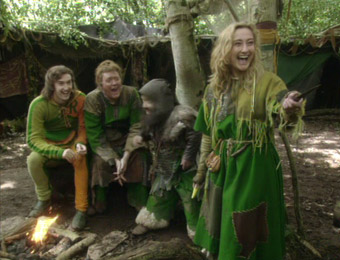
| Miad Marion and Her Merry Men – Series 1 & 2 by Camus |
|
| |
"Common sense and a sense of humor are the same thing, moving at different speeds. A sense of humor is just common sense, dancing." |
| |
William James |
I had the dispiriting experience recently of re-viewing work of mine (not such a problem if you sculpt marble but if you make films and TV, it's somewhat alarming). I sat there muttering the word "Cut!" about four hundred times – and that was while watching a thirty minute documentary. Things change, tastes skew, we expect – nay demand – speed. I can't remember who said "...the trouble with instant gratification is that it takes too long," but that sums things up nicely if not as quickly as desired. Over time, humour mutates into some very odd things from one decade to the next. Maid Marion and her Merry Men is a solid example of a children's series with a twinkling ambition but one whose humour is very much rooted in its time, a pantomimetic (thank you Graham Chapman) prisoner of topicality.
Humour is like the measles. Not everyone gets it. But those who do are strengthened by their short bout of weakness, able to appreciate other frequencies of humour with a more open appreciation of its many byroads. I have found myself in the humour minority more than once. People stare at me, their faces contort into a "But how is that funny?" grimace. Mitchell and Webb's sketches of 'Angel Summoner and BMX Bandit' have my son and I weeping and my partner stands there like Woody in Toy Story after he's flipped open Buzz's helmet. If you could have joined me in a Penzance B & B a few years ago, it would have been a bit cramped but you may have understood why I rate Chris Morris as unspeakably important to our humour landscape. His Brass Eye special on paedophilia was extraordinary – and fiercely funny. But no printed media editorial rant 'got it'. It was not a show about how funny paedophilia was but how paper-cuttingly hysterical our media's reaction was to it. The existence of the outraged editorials made his point even more trenchantly than the programme itself.
My funny bone (to grossly mix my metaphors) casts a wide net. I get a kick out of Morris, the usual suspects of Python and Fawlty Towers, Bill Hicks, The Mighty Boosh and Humphrey Littleton. Bless him. If that last name isn't familiar to you then you are young (and your heart is an open book – and you wouldn't have got that reference either) and don't drive a car a lot. Anyone who drives a car (a lot) and is not into a constant diet of music is eventually attracted to the sanity and comfortable middle classiness of Radio 4. I am uncomfortable with the idea of middle classiness but Radio 4 can't help it. It's like admiring Boris Johnson but not for being a Tory. The surreal panel game, I'm Sorry I Haven't A Clue features some of the most outrageously disgusting humour all played out cunningly disguised by the civility and innocence of delivery by the venerable and sadly missed Jazz trumpeter Humphrey Littleton.
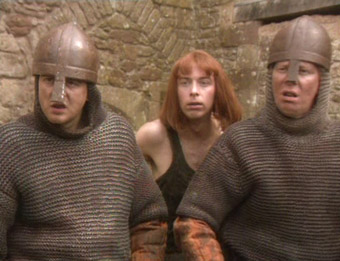
I was terribly moved by the news that some people had laid wreaths at Mornington Crescent tube station after he died. Again, that's a remark for fans of the show but I delight in the fact that (as pointed out by admirer Germaine Greer) the Americans could not get Mornington Crescent (the game) in a million years. I'm not nationalistic or proud of my so called heritage in any way but I do like being in on something that no other culture would have or could have. Of course, other cultures have their own Mornington Crescents but I'm an ignoramus when it comes to understanding them (or actually knowing of their existence). I'll not explain the rules (ha!) of the game. If interested please Wiki it.
The humour that does less well in time is the topical stuff. Duh. By a stroke of serendipity, Bill Hick's stand up sets, venomously shredding George Bush senior after the first Gulf War can be taken and played out against this horrific farce we are in now courtesy of his much-despised son. So Bill somehow (after dying at 33 from pancreatic cancer) stayed topical. Tony Robinson is a talented and immensely likeable performer. My partner made a TV series with him so he's in our orbit and is one of the Labour party's 'celebs'. I find him charming, smart and funny (so I'm biased). His four series of the 1989 BAFTA award winning Maid Marion and her Marry Men (from now on MM) is a delightful but inevitably dated series for children.
"Who is it this time of night? You're not salesmen are you?" |
A Guard at King John's Castle revealing his
and the show's anachronistic credentials |
I take it we all know the Robin Hood myth. A landowner's son returns from the crusades with a scimitar wielding Muslim and (no, that's the Kevin Costner movie). The essential mythic Robin is that he came from a noble family, fought a huge assailant (Little John) on a bridge, earned the respect of forest-dwelling outlaws and had them rob the rich to give to the poor. His principal nemesis was The Sheriff of Nottingham who was always trying to hang Robin and his gang from a yardarm and he was under orders from the pseudo-King who was babysitting the throne while the real King was fighting people in the Middle East who believed something different to his own beliefs. You have got to be criminally psychotic to travel that far just to pick a fight. But this was a long time ago. And they believed all sorts of nonsense that people in this enlightened time don't believe now. Oh (surprise). Oh (depressed).
Tony Robinson, with his lefty leanings thrust out in front of him like that ridiculous little beard he sports in the series, posits that what if Maid Marion was the brains behind the merry men and Robin just a patsy, the person the bad guys feared because they would not accept a woman as a threat? It's a charming idea and at the time it obviously struck a chord. Feminism was more than just a buzzword and Tony was riding a wave. His Marion (plated by Kate Lonergan), was a cross between the new Galactica's Kara Thrace and comedian Helen Lederer; wide eyed with indignation at a society that casually accepted men's power over everything. Now Tony has a thing about medieval history (his Time Team series is a Channel 4 stalwart) and like Terry Gilliam's take on the Middle Ages in Monty Python and the Holy Grail, Tony has a perverse fascination with the grubbiness of the age or more specifically, mud. Allow me a small irony. Tony is peddling muck remover 'Vanish' on TV as a voice over artist (forgive me Tony if it is sound-a-like). "Trust pink, forget stains!" he says, and this after MM's opening rap revelling in the presence of and even the willing consumption of mud.
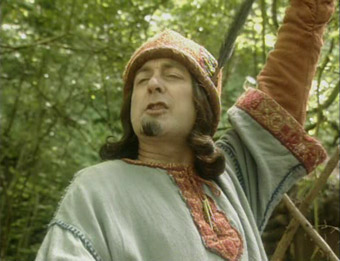
While Tony bags the over the top villainous role of the Sheriff of Nottingham (there have to be perks in creating and writing the show), Danny John Jules is Barrington (better known as Red Dwarf's 'Cat'). He sings along at one of the many songs in the series with a jaunty enthusiasm so mercilessly taken the piss out of by Tony in the featured commentary. Rap is rap and it's not supposed to be safe. All the stock characters from myth are in place but wonderfully subverted. Little John the giant becomes Little Ron the really little tough guy. Robin, played with a charming innocent cowardice and ineptitude by Wayne Morris, is the vain, clothing obsessed merry man who is only nominally in charge. Rabies (Howard Lew Lewis) is the rotten-toothed oaf whose intelligence equals that of a newt's less gifted cousin and later in the second series, Guy of Gisborne turns up. Ramsay Gilderdale plays this role with a gender crossing childlike absurdity that is funny because it's so surreal. Think a wider mouthed Emo. Extraordinary.
Each episode is a playful subversion of the Robin Hood myth that invariably shows off Marion's ingenuity, Robin's vanity, Nottingham's stupidity and the King's verbal ferocity. It is clear everyone's having fun and the series has an atmosphere, like its leads, that is both enticing and almost quaint. It's lodged in the late 80s parodying Comic Relief ('Colin's Release') and a whole host of 80s targets. Tony makes some of these subjects almost fourth wall-breaking, so obvious that he's not alluding to the 1980s but speaking directly from them. I mean the word 'computer' is freely used. Steady on! One thing that was notably amusing was the failure of the bad guys to be able to recognise any of Robin's men with the merest hint of a disguise. Assuming your bad guys are that stupid doesn't really make them bad guys despite the number of threats being issued.
The whole series, at least from evidence of the first two of the four in this huge box set, is a splendid, anachronistic, knockabout farce with some delicious moments (Robin carrying a carpet posing as a carpet layer saying "I've never laid anything in my life..."). I have to bet that was Take 15. I can't imagine any actor being able to control facial muscles from takes 1 to 14. The feminist agenda is hardly that but if it made one little girl in the 80s say "I am as good or better and/or as capable as a boy," then Tony has a right to feel proud.
| Miad Marion and Her Merry Men – Series 3 & 4 by Slarek |
|
Watching seasons 3 and 4 of Maid Marion and Her Merry Men, it occurred to me that of all the televisual genres and sub-genres out there, TV comedy aimed at children is probably the one with the fewest restrictions on content, style or adherence to logic. Adults generally require characters and situations to be at some level rooted in reality, even in comedy, whereas all the kids seem to need is for the whole thing to be silly. Actually, that's a little unfair. They also appear to need a recognisable anchor point around which the silliness can revolve, but once that's established then reality can take a hike. Kids don't see the real world in real-world terms and have a tenuous grasp on reality at best. They are also famously free with their imagination, at least until education, society and even self-preservation beats it out of them. The fact that TV shows and films aimed at kids are made by adults means ensures that this reality abstraction only goes so far, but sometimes the meeting of grown-up logic and childlike abstraction can produce a work that appeals to both age groups, although as an adult viewer you'll usually need a tolerance or even fondness for the ridiculous, which is not really a problem for an audience raised on Monty Python, Black Adder et al.
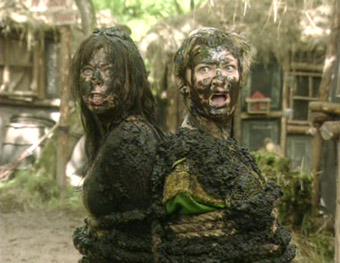
It's this partnership of approach that made Maid Marion and Her Merry Men not only a hit with the junior audience, but has enabled it to build a small cult with older teens and above. This is past legend viewed through the eyes of a mischievous child wearing postmodernist glasses, a 'what if?' view of history that's been retrospectively transformed using modern characters and sensibilities. Working on the basis that even a young audience needs a point of identification, Maid Marion features cast of adult characters with the personalities of children. Thus evil King John is nothing more than a spoilt bully, the Sheriff of Nottingham is a greedy and manipulative idiot, Sir Guy of Gisborne is a petulant 3-year-old trapped in an lanky adult body, and the royal army consists of two guards named Gary and Graeme, both of whom are cheerful, infant-like simpletons. As the title suggests, the outlaws are led not by the fabled Robin Hood, but by Maid Marion, a long-suffering tomboy who comes across as the only smart girl in a class full of nitwits. Dopiest of all is the charmingly named Rabies (played by Howard Lew Lewis, who did tend to specialise in such characters and and can be seen doing similar in the more adult-targeted but splendidly daffy Chelmsford 123 and the late 80s BBC series Brush Strokes), a creature who would probably be too stupid to survive without the assistance of others. Then there's Little Ron, who shuns the irony of his near-namesake of legend by being every bit as short as his moniker suggests, plus a Rastafarian with the very English name of Barrington, who's clearly smarter than he sometimes behaves. Then there's Robin himself, an upper-middle-class Oxbridge reject who's more interested in the cut of his clothes than the problems of the poor.
Which is all very well, but is it funny? Well yes, actually. Silly it may be, but much of the absurdity is genuinely inspired and there are a generous sprinkling of gags targeted squarely at parents who feel obliged to humour their kids by watching it with them: Pizza Hut and celebrity gossip magazine Hello are renamed Pizza Hovel and Good Morrow; Marion tastes a giant jelly baby by tearing off its nipple and eating it; Robin drives the gang barmy with his mud-inspired nouvelle cuisine; and questions over the importance of the discovery of oil (whose eruption is described by resident crone Gladys as a big black geyser, which Barrington assumes is a reference to him) are answered when Nottingham informs the King that this is a product that wars are fought over. Similar satirical barbs pop up throughout, mocking (amongst others) belief in alien life forms, the opportunist greed of developers, and British anti-European xenophobia.
Postmodernist referencing is rife but handled with sometimes unexpected aplomb – the fourth season Crystal Maze parody is an absolute riot, due in no small part to the level to which the pastiche is taken and Wayne Morris's hilarious Richard O'Brien impersonation – while the dialogue and detail suggest that the characters have fallen through a worm hole from the late twentieth century and are trying to recreate the world they have left with whatever comes to hand. Holes are intermittently kicked through the fourth wall, notably in the opening episode of season 3 when Gary and Graham fall over themselves to present scrolls containing the opening credits to camera, and in episode 5 of the same series, when the end credits are read out by the Merry Men as they appear and include "written by Tony Robinson, whoever he is."
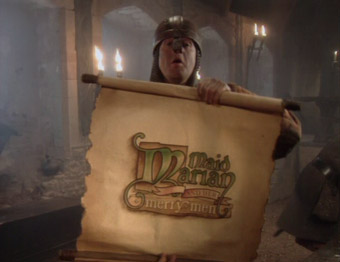
The production values are way above those you'd expect for a British TV comedy series aimed largely at kids and extend to providing between one and three musical numbers per episode, all well produced and choreographed and performed with considerable gusto (there's a specific pleasure in watching a dance number performed by a band of bedraggled medieval peasants). The real surprise is how good some of them are, but the enthusiasm of the thoroughly likeable cast make even the lesser efforts enjoyable to watch.
It's this blend of elements, together with the wit of the scripts (initially all Mr. Robinson's work, but later in collaboration with Mark Billingham and David Lloyd, who play hapless guards Gary and Graeme) and the enthusiasm of the players that has taken Maid Marion beyond its main target audience and into the realms of cult TV. A most effective demonstration of how smart on-screen silliness should be be to entertain rather than irritate, it's the sort of comedy series that should provide all sympathetic viewers with a solid collection of favourite moments. I'll end with a few that I made a note of as I sat and giggled:
Amazed by Barrington's impersonation of King John, Rabies remarks that it's like the King is inside Barrington, to which Little Ron responds, "Maybe he swallowed him by mistake."
Demanding a search of the district, the Sheriff orders Gary and Graeme to "Look under every stone and inside every badger."
As part of a ruse to hoodwink Guy, Robin attempts to explain to him that one of the Merry Men, a ludicrously costumed Snooker, is in fact Guy's invisible alien friend and that nobody else can see him. "It's perfectly simple," he says, pointing at Snooker. "You see that guy there? Well we can't!"
The medieval style Chinese takeaway that Robin blags food from provides a number of obvious but well-delivered gags. "Got any spare ribs?" Robin asks the proprietor. "No," comes the reply, "just the usual number."
The opening credits of the Christmas special that amusingly mock the Star Wars scrolling text and then dissolve into an energetic tap number featuring the peasants and the Merry Men, which turns out to be Barrington's weekly dance class. Robin, of course, is wearing Lycra.
The boys' choir that delivers a musically sublime hymn whose opening line is "The King of England is a pig..."
My personal favourite, because it made me laugh out loud for reasons I can't quite nail, has Marion congratulate the dancing villagers on their fantastic sense of rhythm, to which one of them replies, "Ah, well, it's the hundreds of years of oppression, you see."
Oh yes, and that theme song is impossibly catchy. "Oh...Mar-ri-on...."
Camus: Maid Marion and her Merry Men was shot on tape in the late 80s and early 90s so quality is variable. The first two seasons didn't seem to offer much in the way of contrast and the whole series has a browny/green (Lincoln one might say) hue to it. A lot of smoke effects were used which also softens the picture up but all this is a bit like criticising Pavarotti's shoes. It's the voice you came for. Basic Dolby 2.0 is fine and clarity is maintained throughout.
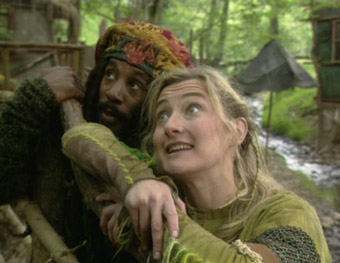
Slarek: Seconded to some degree, although the contrast on series 3 and 4 is generally rather good, save for some of the dimmer interiors. What is pleasing is how well the shows have been transferred to DVD, with no obvious enhancement or compression artefacts. The framing is 4:3 and the soundtrack Dolby 2.0 stereo.
Camus: The menus are animated like close ups from Nintendo's Zelda and they retain that wonderfully cheesy retro computer look that faster processor speeds have all but banished from our screens.
Slarek: The CG menus are rather fun. Those on series 3 are based on a peasant hut interior – leave it alone for 2 loops of the animation and the bubbling cooking pot explodes and the screen goes black.
Series One [Camus]
Commentary Track Ep 1 – Tony Robinson only
Tony's commentary is affectionate but nicely catty too. He sends up himself as much as his other cast members though Kate Lonergan (Marion) is still revered for those wider than wide eyes. It's a memoir wrested from late 80s mud and recollected 20 years later with fondness and appreciation (not to mention tongue in cheek barbs) of the talent.
Quiz written by Tony Robinson
As it says on the tin.
Maid Marion Karaoke (Lute – 1:23)
The lute graphic which invites your to click on a tuner, takes you to a karaoke version of MM's main theme. Silly but very in-keeping with the 'mood' of the discs.
Easter Egg – derivation of names of the characters (Lute Tuner – 1:13)
Click on another tuner and we find an Easter Egg of Tony Robinson explaining how all the characters names came to be, ending on a cracker that even the Beeb would not let through – he wanted to call the old lady peasant and young girl peasant, Chlamydia and another female genital infection whose name temporarily escapes me.
Trailer (from VHS – 0:34)
What do the Beeb use as archive these days? All those stories about new episodes of Dad's Army turning up on a U-matic tape... This trailer (granted, not vital to archive) has come off a VHS – boy, can you tell.
How the Germans saw it (Klammer 1 – 4:27, Klammer 2 – 4:18)
This takes me back to two things that, as a child, used to reduce me to hysterics. The first was seeing someone on film/tape played backwards. You soon don't find this funny if you've cut as many films as I have. The second is seeing a well-known voice dubbed. So the German versions of Maid Marion may raise a titter but almost 9 minutes of them? Overkill, methinks.
Exclusive Booklet TR drawn by Paul Cemmick
This graphic representation of Maid Marion's world (written by Tony Robinson of course) is a pleasing physical extra that again is in perfect keeping with the whole venture.
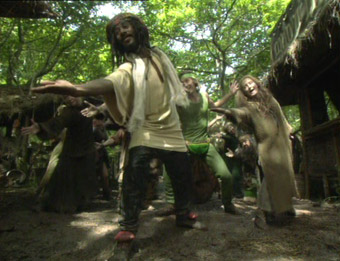
Series Two [Camus]
Commentary Track Ep. 1 with TR, Maggy Chappelow (costume designer, Christine Powers (make up) and David Bell, director.
Reminiscences abound in this affectionate commentary track by some of the backroom girls and boys. It's clear there is an enormous amount of affection for the series. David Bell steers the whole enterprise with wry directorial comments but it's a credit to all that each participant gets to deliver a slice of nostalgia.
Commentary Track Ep. 3 with David Bell, director, Mike Edmonds (Little Ron),
Howard Lew Lewis (Rabies) and David Lloyd Graham.
Again director David Bell officiates this actors' reunion and the much older (and slower) voices of the actors recall their time on the series. It's simply very touching that the actors are participating in the DVD Box Set. It's laudable and features some laughs along the way (if a tiniest tad self indulgent – but what commentary track is not indulgent)? Subjects that come up are the armourer's narcolepsy, Subbuteo™ and the fact that for health and safety reasons (yawn), rubber arrows were used and rather obviously in some scenes. This of course just adds to the fun of the whole enterprise.
BBC Internal Trailer (7:20)
BBC Worldwide (in existence before or after 1989 I do not know) is now charged with selling the Beeb's content throughout the world. Back in '89, the TV shows had to prove their worth in house by making a promotional video for their own marketing arm. Strange but true. So we end up with Tony Robinson introducing his series and why the Beeb marketing folks should work especially hard to sell it. It's a curious addition to what is in effect a children's series
Hunt The Chicken
OK! This is where you have to hunt the chicken. The hiding places are numerous and the 'game' tedious in the extreme unless you are 5 years old. I quite enjoyed it. Just the once though.
Exclusive Booklet TR drawn by Paul Cemmick
See comments made from Series One remarks.
Series 3 [Slarek]
Episode 3 Commentary
Tony Robinson, Kate Lonergan, Howard Lew Lewis and associate producer Alison Law recollect the episode in which Marion's mother (Patsy Byrne, familiar as Nursie from Blackadder II) comes to visit. It's not quite as lively as you might expect, but some interesting tidbits emerge about the production and the contributors' work on it. Oh, and about Howard Lew Lewis's motorbikes.
Tony Robinson, Mark Billingham and David Lloyd discuss creative writing (10:02)
An engaging and revealing sofa chat in which the three discuss how Billingham and Lloyd began contributing to the storylines and how their writing careers have blossomed since, with Lloyd writing scripts for Doctors and Eastenders and Billingham now a bestselling author of crime fiction novels. A little bit of deliberately visible and audible censorship is applied when Tony Robinson expresses his frustration that his two friends are now more successful as writers than him.
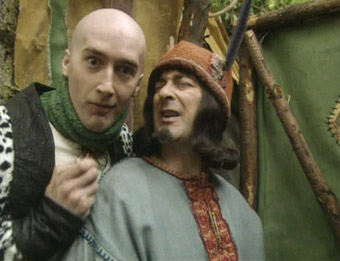
Photo Gallery (3:26)
A rolling gallery of on-set photos set to the main theme, all full screen (thank you).
Series 3 also contains the double-length Xmas Special episode, which is located where the extras would be on disc 2.
Series 4 [Slarek]
Episode 1 Commentary
Episode director David Bell and performers Kate Lonergan, Mark Billingham and Forbes Collins share some memories of a fan favourite episode. Again not as boisterous as you might hope, but there are some interesting and enjoyable snippets, not least Bell's admission that directing the musical numbers was far and away his favourite bit of each episode. It will no doubt amuse cult movie fans to hear one of the cast remember that Richard O'Brien was in The Rocky Horror Show, seemingly unaware that he also wrote it.
Episode 5 Commentary
Performers Mike Edmonds, Kate Lonergan, Tony Robinson and Danny John Jules provide the liveliest (and most clearly recorded) commentary of series 3 and 4 – you won't learn a huge amount about the making of the programme but it's a fun listen nonetheless. All of them praise the repertory company that played the villagers and Wayne Morris's skill as a comic performer, while Danny John Jules takes flak from the others when his phone goes off (twice) and Kate Lonergan complains of one costume, "Doesn't my bum look big in that!"
Improvised Sketches by the Cast (5:54)
At what looks like a reunion bash, the cast members stage some piss-taking sketches of variable comic value, but some are pulled off in amusingly naturalistic fashion – David Lloyd and Mark Billingham's opening suggestion that Tony Robinson was an on-set monster is particularly well done.
Maid Marion Cartoons – Tony Robinson Talks to Paul Cemmick (4:40)
Tony Robinson talks to the man who drew the Maid Marion spin-off comic books, which apparently didn't sell too well but are fabulously drawn. Short but interesting.
Exclusive Booklet drawn by Paul Cemmick
A with series 1 and 2, booklets for the series 3 and 4 are included and are a fun inclusion.
Camus: For a fan and viewer in the late 80s, this is a welcome multi-slice of nostalgia. For the newbies, it's (ironically) a slice of TV history revelling in the history of its own mythology. If you want to smile (and your kids to embrace it) it's well worth picking up. My son watched every episode on a single road trip and that says a lot about its continuing appeal.
Slarek: From our brief email discussions of the series, I have a feeling that I enjoyed my episodes even more than my fellow reviewer did his, more than I thought I would and for reasons I wasn't always expecting (and yes, perhaps nostalgia is one of them). It's a measure of how much fun I got out of it that I'm keeping my promise and sending the third and fourth series up to Camus for his son to revel in, then I'm ordering my own copy. For those who like their silliness with smarts, warmly recommended. Sire.
Re-release update: The box set has been re-released by Eureka in April 2011, but appears to be exactly the same as the version detailed above. If you've already got it there's no need to upgrade, but if you missed out the first time round then the above recommendation still warmly stands.
|